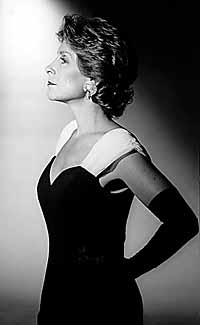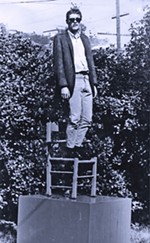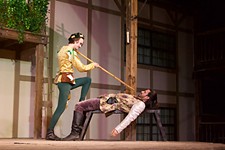Exhibitionism
Latino Comedy Festival: Ripeness Is All
Fri., Aug. 20, 1999
August 13
In the entertainment world right now, Latino comedy is hotter than Austin asphalt in August. Headliners like Carlos Mencia and George Lopez are playing across the country to packed houses, and many of the cable networks are focusing on a large crop of talented performers who are getting noticed at numerous Latino showcases throughout the Southwest. Adding to this trend, events like the Big Stinkin' Improv & Sketch Comedy Festival and the strong lineup of comics regularly appearing at Capital City Comedy Club have given Austin a high profile on the national scene. The time was ripe for a local Latino Comedy Festival, and the Latino Comedy Project stepped in and seized the day.
The show opened with two widely differing styles of stand-up comedy. Gabriel Iglesias, a nationally touring comic from Los Angeles, hosted the show and slayed the audience with an impressive array of mimicked voices and sound effects. His unique talents allowed him to add a lot of spice and color to his bits about the adventures of a hefty young Latino living "La Vida Gorda." Next on the bill was Adrian Villegas, artistic director for LCP and a young man with a lot on his mind. His confrontational style was a sharp contrast from Iglesias'. While some of his material came off as more angry than funny, he had many valid points and intelligent insights. One of my favorite bits focused on the dearth of Latinos in mainstream entertainment. "I go to movies, I see white people. I turn on TV, I see white people. I open a magazine, white people. I turn on Telemundo for a little Latin culture, what do I see? Latinos that look like white people!"
How ironic it was, then, for the show to turn from Villegas' hard-edged political commentary to the wacky antics of the predominantly white troupe Ray Prewitt's Fourth Grade Class. Their set featured quirky stuff like Hannibal Lecter calling Clarice Starling's answering machine to deliver a Swingers-inspired monologue. Their flatulent fiancée sketch proved that if you're going to do a fart joke, make it a BIG fart joke. Eric Peterson's "Slap Happy Pappy" brought down the house, and Chuy Zarate's Kinison-inspired preaching closed the set with a rousing rendition of "Let Your Love Flow."
The audience energy carried over nicely into the headlining set from the Latino Comedy Project. I hadn't seen LCP in nearly a year, and their latest set showed evidence of a lot of hard work in the interim; displaying a confident command of the stage, the LCP is now a well-oiled machine of merriment. The 11 actors in the cast represent a wide range of physical types and characters, but all share solid theatrical backgrounds. The result is a wild ride through the Nineties with a decidedly Latino viewpoint, executed with quick costume changes and seamless transitions. The troupe took shots at everything from the INS to Mexican TV to George Bush, Jr. Most of the characters were so accurately portrayed that even a gringo like myself could recognize the Latino archetypes. Villegas and Diana Chavez were delightful as singing spokespersons in cheesy commercials, and the game show Desgraciados blew the roof off the theatre. Patricia Arredondo and Erica Saenz bring such zany energy to the stage that you laugh as soon as they appear. The men in the cast were equally impressive, but there's too damn many of them to list by name.
While the Latino community supports their comics by showing up in droves, the Anglo community doesn't follow suit; I was disappointed that so few white fans attended. Even with my feeble command of Spanish, I was able to follow the entire show, and the LCP's humor can be appreciated by anyone who has had the slightest contact with Latino culture. Here's hoping the modest beginnings of this festival have solidified a local fan base for the LCP and given them a foundation from which to achieve national exposure. They're sure as hell ready for it. -- J. C. Shakespeare
THE TOURIST TRAP: FUN FROM & FOR ALL AGES
Austin Children's Museum,
through August 29
Running Time: 30 minutes
Commedia dell'arte is that 400-year-old scenario-based Italian comic theatre of the streets. Stock characters, some with masks, engage in a full-sized Punch-and-Judy show that adds adult doses of cunning, charm, and wit to the physical humor of the performance. A young company of Austin actors is dedicated to putting the original Italian form back on the stage, paying as much attention to the history of this bright, no-frills theatre as to the obvious connections with the cartoons of our youth.
I Megalomani, the acting wing of the Austin Commedia Society, is performing a lazzi (comic scenario) in which two greedy fathers attempt to wed their unwilling wards for status and profit: Capitano for a fortune, Pantalone for improved position. But Ottavio and Silvia wish to marry for love. The servants Columbina and Arlecchino scheme to defraud their masters of much money (and no small measure of self-respect) while conning the two lovebirds into matrimonial bliss. The unfolding of the highly contrived plot results in the sort of humor that has led audiences to laughter for centuries.
The show at the Austin Children's Museum theatre is cute, the kiddies (most under six years old) were enthralled, the parents stayed to watch, and artistic director Aaron Johnson noted rightly that this brand of theatre mixes the Muppets with old Warner Bros. cartoon madcaps -- an age-old combination of slapstick with an ample dose of sly, political pokes and jabs for the oldsters to appreciate. If the physical fisticuffs were not uniformly sharp -- some cast members seem to possess more of that much-needed grace-in-pratfall than others -- this lazzi moves along at such a clip that it's bound to keep your interest. And even though you know how it must end, it's the getting there that makes this such ageless fun. -- Robi Polgar
TRIBUTE TO TIN PAN ALLEY: SWEET HISTORY
|
|
Zachary Scott Theatre Center
Whisenhunt Arena Stage,
August 15
For many, the term 'history lesson' suggests a dry and dusty audit of some antique past, conducted by an ancient scholar almost as dessicated as the bones of his subject. But for those who attended the history lesson this past weekend at the Z Cabaret, the term ought to possess a much livelier character. Make no mistake, it was a history lesson; from the get-go, longtime local chanteuse Mady Kaye made it quite clear that her "Tribute to Tin Pan Alley" was intended to enlighten its audience regarding the history of 20th-century American song. Via her opening aural collage, she walked us back in time to the streets of New York City just after World War I, where we could hear the music publishing house "pluggers" -- in-house pianists whose job was to play the company's hits over and over and over -- tickling the ivories for passersby. And throughout the show, she filled our ears with names and dates, the hired-gun composers and lyricists whose melodious creations changed the face of popular music and the years in which they scored some of their biggest hits. Yes, Kaye was holding class last week. But when the subject of the lesson is as rich in romance and humor as America's Golden Age of Song and your guide through the past is as enthusiastic and appealing as Mady Kaye, well, then the lesson is a pleasure.
Kaye is an unabashed fan of the Great American Songbook, and just watching her fervor for it can be captivating. She dances her way through the subject, gliding from anecdote to anecdote, spinning from this composer to that, praising their work in turns light and graceful. And occasionally she's even inspired to kick up her heels literally, as in a sprightly Charleston number. Her elation pulls us in and infects us.
But Kaye beguiles her audience with more than her broad smile and playful patter. She is a skillful interpreter of Tin Pan Alley's classics, and when she gives voice to these masterpieces of wit and romance, she communicates all the craft, all the feeling that has made these songs standards not merely because they brought a standardized approach to song structure but because they are embraced the world over as the standard for popular songs. Kaye's polished technique makes every word clear, every clever phrase ring, even when her delivery is hushed. In fact, some of the singer's most effective work comes when she sings softly; her voice comes out like a taut thread of silk: shiny but surprisingly supple and strong.
In one "class," Kaye couldn't possibly cover all the great songsmiths of Tin Pan Alley, but with a program that included such highlights of the Golden Age as Vincent Youmans & Irving Caesar's "Tea For Two," Fats Waller's "Keepin' Out of Mischief Now," Richard Rogers & Lorenz Hart's "Manhattan," George & Ira Gershwin's "They All Laughed," Cole Porter's "You're the Top," Harold Arlen & "Yip" Harburg's "Over the Rainbow," and Duke Ellington's "It Don't Mean a Thing If It Ain't Got That Swing" (which swung with a mighty jazz piano solo from accompanist Jeff Hellmer), Kaye's "Tribute" provided a winning introduction to the subject, a survey course right up our alley. -- Robert Faires









